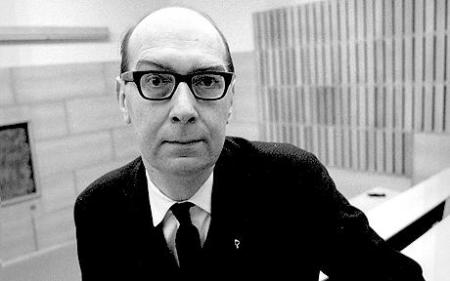
William Faulkner
According to William Faulkner, it is permissible for an artist to engage in all manner of malfeasance and loutish behavior because “An artist is a creature driven by demons.”
The writer’s only responsibility is to his art. He will be completely ruthless if he is a good one. He has a dream. It anguishes him so much he must get rid of it. He has no peace until then. Everything goes by the board: honor, pride, decency, security, happiness, all, to get the book written. If a writer has to rob his mother, he will not hesitate; the “Ode on a Grecian Urn” is worth any number of old ladies. (h/t Ta-Nehisi Coates)
It is common for supermacho bibulous writers such as Faulkner, Kingsley Amis, Ernest Hemingway and Christopher Hitchens to confuse self-avoiding cowardice and self-destruction with courage and an intrepid dedication to art. Amis, for example, wrote entire books celebrating the wonders of alcohol. Hitchens thought that crawling into a bottle every day was something to boast about and he was dismissive of people who lack the requisite foolishness to become nicotine addicts. In the sick, sad world of Christopher Hitchens, teetotaling joggers are the real losers.
Stephen King, a man who knows a thing or two about both writing and substance abuse, has a name for the hyper-masculine variety of denial celebrated by various dipsomaniacal American authors: The Hemingway Defense.
as a writer, I am a very sensitive fellow, but I am also a man, and real men don’t give into their sensitivities. Only SISSY-men do that. Therefore I drink. How else can I face the existential horror of it all and continue to work? Besides, come on, I can handle it. A real man always can.*
King explicitly rejects all such poppycock. He argues that “[t]he idea that creative endeavor and mind-altering substances are entwined is one of the great pop-intellectual myths of our time.”
Unlike writers such as Faulkner who lack the necessary self-awareness to confront their “demons,” when given the choice, Stephen King wisely selected his health and his family over the bottle. Thus he has no use in mythologizing the inebriated scribbler.
Substance abusing writers are just substance abusers—common garden-variety drunks and druggies, in other words. Any claims that the drugs and alcohol are necessary to dull a finer sensibility are just the usual self-serving bullshit. I’ve heard alcoholic snowplow drivers make the same claim, that they drink to still the demons.
Faulkner asserts that it is perfectly natural and wholly acceptable for a writer to be a scoundrel because a true artist “is completely amoral in that he will rob, borrow, beg, or steal from anybody and everybody to get the work done.”
Sadly, people who think like Faulkner have gotten existence precisely backwards. As King notes, “Life isn’t a support system for art. It’s the other way around.”
William Faulkner notwithstanding, no art is essential to humanity, and no poem, not even one as lovely as “Ode on a Grecian Urn,” is worth the well-being of a single old lady. Humanity will grope along with or without any particular work of art, and Earth will continue to abide long after we’re gone no matter what we do. It is expressly because everything we do is ephemeral that the artist’s humanity is of far greater value than anything he could possibly create.
Perhaps it is a longing for a false sense of immortality that leads people to engage in such diseased thinking. But it’s important to remember that although Hamlet will continue to live on for as long as humanity is extant, William Shakespeare is just as dead as the fellow buried next to him. As Groucho Marx pithily noted: “What has posterity ever done for me.”
Only love conquers death.
*All Stephen King quotations are from his marvelous memoir On Writing
by Richard W. Bray


